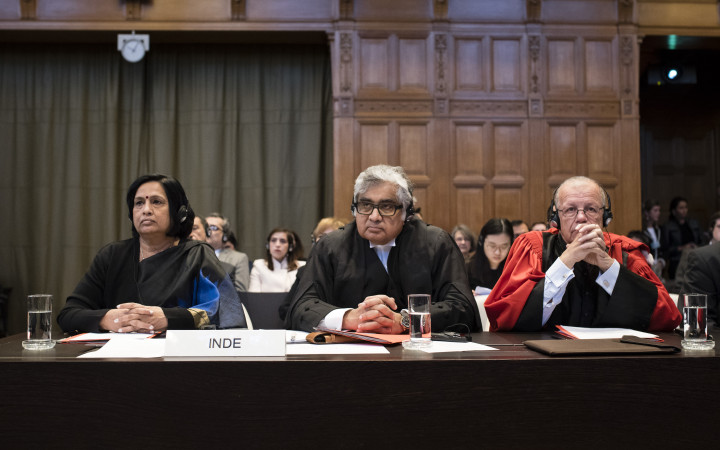The International Court of Justice (ICJ) today concluded the preliminary phase of oral arguments in nuclear disarmament cases brought by the Republic of the Marshall Islands (RMI) against India, Pakistan and the United Kingdom. The hearings, which took place at the ICJ from 7-16 March, were the first contentious cases on nuclear disarmament ever heard at the Court. This set of hearings addressed the respondent nations’ objections to the cases relating to questions of jurisdiction and admissibility.
This morning, India delivered its final oral arguments. India’s legal team doubled down on its assertions that its words speak louder than its actions. While repeatedly highlighting “irrefutable evidence of India’s positions in United Nations forums on disarmament,” India’s lawyers denied that test-launches of nuclear-capable missiles – including on Day One and Day Three of the ICJ’s hearings in the case against India – indicated participation in the nuclear arms race.
Mr. Amandeep Gill, co-agent of India, expressed dismay that Tony de Brum, co-agent of the Marshall Islands, told the Court that India’s nuclear arsenal threatens the world. “What else,” asked Mr. Gill, “could be more political, more contrived and more artificial than this allegation of a threat to the world?” A 2013 report by International Physicians for the Prevention of Nuclear War entitled “Nuclear Famine: Two Billion People at Risk” shows that, even in a “limited” nuclear war using as few as 100 nuclear weapons anywhere in the world, the global climate and agricultural production would be disrupted so severely that the lives of more than two billion people would be in jeopardy.
Mr. Alain Pellet, Counsel to India, wondered aloud why the Marshall Islands is now “making such a big fuss” about the International Court of Justice’s 1996 Advisory Opinion. The ICJ ruled in that opinion that for all nations, “There exists an obligation to pursue in good faith and bring to a conclusion negotiations leading to nuclear disarmament in all its aspects under strict and effective international control.”
In the afternoon session, the Marshall Islands presented its final oral arguments in the case against the United Kingdom. Phon van den Biesen opened the session by answering the question posed by Judge Bennouna at the Court last Friday. Mr. van den Biesen presented numerous examples to the judges illustrating the Marshall Islands’ interpretation of Article VI of the Non-Proliferation Treaty (NPT) at the time that its Application against the United Kingdom was filed (24 April 2014).
Tony de Brum, co-agent and former foreign minister of the Marshall Islands, concluded today’s arguments against the United Kingdom. He said, “The States possessing nuclear weapons that joined the NPT made a legally binding promise, in accordance with the goals they expressly adopted in the NPT Preamble, to pursue in good faith negotiations leading to nuclear disarmament and cessation of the nuclear arms race, pursuant to Article VI. The dispute in this case is over whether the UK is in breach of that bargained-for, legal obligation.”
He continued, “At the end of the day, the UK position boils down to an assertion that the RMI has no legally enforceable rights under NPT Article VI. If that were true, the Strategic Bargain of the NPT is illusory.” The strategic bargain to which Mr. de Brum referred is, at its core, that NPT signatories that possess nuclear weapons promise to negotiate the elimination of all nuclear weapons in exchange for non-nuclear-armed signatories agreeing never to acquire such weapons.
Mr. de Brum again asked the Court “to adjudge and declare that the Court has jurisdiction over the claims of the Marshall Islands submitted in its Application of 24 April 2014; and to adjudge and declare that the Marshall Islands’ claims are admissible.”
The 15 judges of the ICJ, along with judge-ad-hoc Mohammed Bedjaoui, will now deliberate on jurisdiction and admissibility issues raised in the written and oral pleadings. The Court will announce its decisions in a public sitting at a date to be announced.
Rick Wayman is Director of Programs at the Nuclear Age Peace Foundation, a consultant to the Republic of the Marshall Islands. He is tweeting about the ICJ hearings at @rickwayman.






